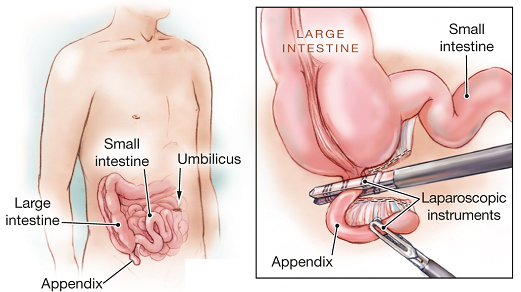Appendicitis is a painful emergency during which your appendix becomes inflamed and the opening becomes clogged. The appendix, which looks like a small pouch attached to your large intestine, can cause intense pain in the right side of your abdomen. Appendicitis can also lead to emergency surgery, but fortunately, it is the most common emergency surgical procedure, which means that an appendectomy is quite safe. However, appendectomy recovery time might surprise some patients.
Appendectomy Recovery Time
After appendectomy, you may get up and move around within 12 hours. Usually, you can go back to normal activities in 2 to 3 weeks.

This appendectomy recovery time varies depending on the following factors:
- First there is the overall health of the patient – someone who is young and strong will heal much faster than someone who is elderly and frail.
- Underlying conditions matter too. For instance, someone with diabetes might have a tougher time healing from the surgery.
- Then there is the surgery itself. Patients who undergo a laparoscopic surgery will be in much better shape than those who undergo an open more serious operation because the laparoscopic surgery involves only a few tiny incisions, and pain is much less, but those who have to have an open operation will take much longer to heal and can even expect to spend several days in the hospital.
- Finally, those who get their appendectomy before the appendix bursts will see a much faster appendectomy recovery time. Those who are dealing with a burst appendix will have a more extensive surgery, as well as the risk of complications, such as infection. These will have to be managed very closely, which can extend recovery time.
How to Recover from an Appendectomy
Those who have had the surgery can reduce their appendectomy recovery time by taking good care of themselves.
- For the first few days, you will need to take medications for pain as directed.
- If you have had open surgery, you have a serious wound that will need to be properly dressed and watched closely for infection.
- Those who have had a laparoscopic surgery will have smaller incisions and not as much risk of infection; however, they can suffer from serious gas pains and something known as "referred pain" in the shoulder. This pain is caused by trapped gas in the abdomen. Medications to relieve the pressure and pain are recommended.
- Some people might experience constipation, not only from the surgery but from the painkillers as well. A stool softener can help alleviate this problem. It is also important to take medication for pain only when you need it.
- Appendectomy recovery time might be lengthened by being too active too soon. Therefore, you will need to take it easy for a few weeks. This means no strenuous exercise, no lifting of heavy objects, and other restrictions that your doctor might impose.
When to Call a Doctor
In most cases, appendectomy recovery time will be short, and you will be back to your old self very soon. However, some people do experience complications. These might include a high temperature, a wound that is hot to the touch and looks red and swollen, any discharge coming from the wound, increased pain and vomiting. These are all indications of an infection, and a good reason to call the doctor immediately.
What to Expect During an Appendectomy
The surgery itself is relatively straightforward. During either procedure, you will be under general anesthesia and will not feel anything. During the open procedure, the surgeon makes one large incision in your abdomen, removes the appendix with specialized tools, and then seals the wound back up with stitches. A few incisions are made, each about an inch long, to insert tools into the abdomen. The abdomen is filled with air so the surgeon can see what he or she is doing. Then the process continues just as if it was an open surgery, but the recovery time is much less.
Are There Any Risks of Appendectomy?
As with any surgery, there are risks. An appendectomy, though a common surgical procedure, can cause complications. The biggest risks include infection, particularly if the appendix has ruptured before or during the surgery. Other risks include bleeding under the skin that might cause an enlarged, hard spot, scarring where the incisions were made, an abscess usually caused by the appendix bursting, and a hernia where the muscles were cut through to enter the abdomen.
Keep in mind that the surgery is done under general anesthesia; therefore, the risks associated with the anesthesia are something to keep in mind. Even so surgery is usually the recommended path to treating appendicitis because it is safer than many other emergency procedures.
